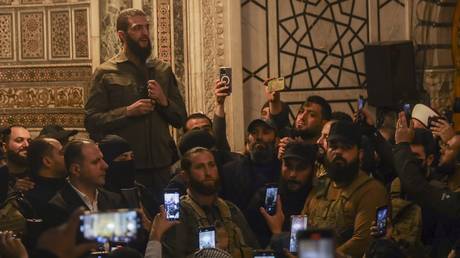US cancels $10-million reward for new Syrian leader
Washington’s envoy stated that it would be “incoherent” to engage in negotiations with individuals on a US wanted-terrorist list following discussions with HTS in Damascus.

The United States will no longer offer a $10-million reward for information leading to the capture of Ahmed Hussein al-Sharaa, known more widely as Abu Mohammad al-Julani, following a recent meeting between a Washington delegation and the leadership of Hayat Tahrir al-Sham (HTS) in Damascus on Friday.
Earlier in the month, Syrian opposition forces, led by HTS jihadists, launched an unexpected offensive across the country, capturing several significant cities, including the capital, Damascus. As a result of this upheaval, Bashar Assad resigned as president and was granted asylum in Russia.
In a move towards broader diplomatic “engagement” with the new Syrian leadership, Barbara Leaf, the US Assistant Secretary of State for Near Eastern Affairs, headed a delegation to Syria. This visit marks the first time American diplomats have gone to the country since the US embassy in Damascus was closed in 2012.
During her discussions with al-Sharaa, Leaf addressed several important issues, including the need to prevent terrorist groups from operating in Syria and ensuring the protection of minority and women's rights.
“We also discussed the critical need to ensure that terrorist groups cannot pose a threat inside Syria or externally, including to the US and our partners in the region,” Leaf said in a telephone briefing from Jordan. “Based on our discussion, I informed him that we would not be pursuing the Rewards for Justice offer that has been in effect for some years.”
Despite this decision, HTS is still classified as a foreign terrorist organization by the United States, and the sanctions associated with this designation remain active. Leaf explained that withdrawing the bounty is part of a policy shift aimed at legitimizing engagement with the group.
“If I’m sitting with the HTS leader and having a lengthy, detailed discussion, it’s a little incoherent to have a bounty on his head,” she remarked. “Otherwise, I should ask the FBI to come in and arrest him or something.”
The US delegation also included Roger Carstens, the Special Presidential Envoy for Hostage Affairs, and Daniel Rubinstein, a senior adviser dealing with relations with the new Syrian forces. They addressed the fate of missing American journalist Austin Tice, who disappeared in Syria in 2012, among other topics.
This week, the US military announced it had doubled its troop presence in Syria to about 2,000 before Assad's departure to prevent the Islamic State from exploiting the instability. Additionally, the Pentagon carried out airstrikes in the northeastern part of the country on Thursday, reportedly killing one of the terrorist group’s leaders.
While an immediate reopening of the US embassy in Damascus is not on the agenda, Leaf indicated that future diplomatic recognition would hinge on the actions of the new Syrian authorities.
Allen M Lee for TROIB News












